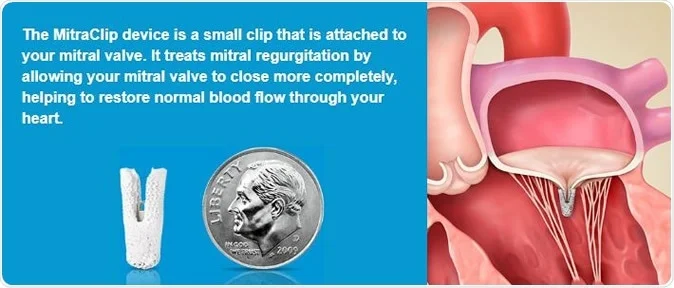“Will The MitraClip Help My Mom?” asks Brian
Written By: Adam Pick, Patient Advocate & Author
Medical Expert: Dr. Marc Gerdisch, Chief of Cardiac Surgery at Franciscan Health
Published: June 7, 2022
I just received a great question about the MitraClip. Brian writes to me, “Adam, my mom, who is 78-years-old, was unexpectedly diagnosed with severe mitral regurgitation. She is active but definitely slowing down. I’ve been reading about the MitraClip as I’d like her to avoid open heart surgery. Is the MitraClip an appropriate therapy for my mom?”
To help Brian answer this important question, I connected with Dr. Marc Gerdisch, the Chief of Cardiac Surgery at Franciscan Health in Indianapolis, Indiana. Dr. Gerdisch is a mitral valve expert who has performed over 4,000 heart valve operations during his career. In our community, Dr. Gerdisch has successfully treated over 120 patients including Dan Rhoden and Janelle Hurst.
Key Learnings About the MitraClip
Important learnings shared by Dr. Gerdisch in our interview include:
- There are two distinct indications for using the MitraClip for patients with leaking mitral valves.
- First, the MitraClip has been shown very effective for heart failure patients with cardiomyopathy (an enlarged heart) that causes the mitral valve to leak. For this type of patient, the MitraClip (i) decreases the mitral valve leak, (ii) may improve the geometry of the heart, and (iii) enhance cardiac function. As Dr. Gerdisch states, “The MitraClip has been a miracle for some of the older and especially more frail people who are experiencing heart failure because the valve leaks.” Dr. Gerdisch believes that if Brian’s mom has cardiomyopathy, the MitraClip could be a good treatment.
- Second, the MitraClip has been shown effective for patients who have a leaflet issue associated with mitral regurgitation. However, Dr. Gerdisch states that the use of the MitraClip for a healthy and active 78-year-old patient may be debatable. Dr. Gerdisch states, “The MitraClip in a 78-year-old otherwise healthy person with organic disease to the valve, in other words, the valve is regurgitant and is leaking because one of the leaflets is flail, that’s a little debatable. I’ll tell you the reasons why. One is, obviously, that we could do the surgery minimally-invasively with low risk. The second reason is that we could do the procedure through a small incision and recovery isn’t very dramatic and usually people get through it fine. The third reason is that we don’t have a lot of data on degenerative disease with the clip. We have good data, decent data. What we know is that when the anatomy is very favorable, a discrete portion of the leaflet that is flail, and it’s favorable in the sense that the clip can grab it, then it’s actually pretty good outcome.”

- Regardless of whether-or-not the MitraClip is used, the goal for the mitral valve patient and their medical team is to eliminate as much of the regurgitation as possible given the patient’s health and risk factors. As Dr. Gerdisch states, “It’s important that that regurgitation be gone.”
- Calcification may be a key consideration for patients and medical teams as they determine if a MitraClip can be used to treat mitral regurgitation.
 Calcified Mitral Valve
Calcified Mitral Valve
- Specific to the decision-making process among patients, families, cardiologist and surgeons, Dr. Gerdisch suggests there are several nuances to be considered. Dr. Gerdisch states, “I think there are layers of conversation that are worth having. The questions are: Is the valve leaking because of changes in the structure and function of the left ventricle and not a problem with the valve? In those cases, lean MitraClip. Is it a discrete, easy to fix lesion in somebody who you really are trying to stay away from heart surgery? It’s reasonable to consider the MitraClip in that patient. Is it a complex leak that you’re not sure is going to go away with one MitraClip and the patient is otherwise reasonably healthy at 78? Those patients need to at least be given the option to have a minimally-invasive operation to treat their mitral valve.”
- Dr. Gerdisch’s advice for patients and their families in a similar situation to Brian’s mom is (i) learn about the available treatment options, (ii) have detailed conversations with medical teams that specialize in mitral valve therapy, (iii) find doctors with whom you are comfortable with, (iv) realize that most mitral valve procedures are not emergencies, and (v) do everything possible to make the mitral valve operation a “one-time event”.
Many Thanks Dr. Gerdisch & Franciscan Health!
On behalf of our entire patient community, many thanks to Dr. Gerdisch for sharing his clinical experience and research with our community! Also, many thanks to the Franciscan Health team for taking such great care of heart valve patients.
Related links:
- MitraClip Success: Michelle Will Not Need Heart Transplant Thanks to MitraClip
- Surgeon Insights: Minimally-Invasive Mitral Valve Repair Surgery
- Stroke Risk & Heart Valve Calcification: What Should You Know?
- Surgeon Q&A: Will I Need Mitral Valve Surgery?
Keep on tickin!
Adam
P.S. For the hearing impaired members of our patient community, I have provided a written transcript of this video below.
Video Transcript:
Adam Pick: Hi, everybody. It’s Adam with heartvalvesurgery.com. Today we’re answering your questions about the use of the MitraClip for the treatment of severe mitral regurgitation. I am thrilled to be joined by Dr. Marc Gerdisch who is the chief of cardiac surgery at Franciscan Health in Indianapolis, Indiana. During his fantastic career, Dr. Gerdisch has performed over 6,000 cardiac procedures of which more than 4,000 involved some form of heart valve repair or heart valve replacement. Dr. Gerdisch, it is great to see you again. Thanks for being here.
Dr. Gerdisch: Thanks for having me, Adam. Always happy to be here.
Adam Pick: Yeah, so let’s get to Brian’s question which is all about the MitraClip, Dr. Gerdisch. He asks, “Adam, my mom, who is 78, was unexpectedly diagnosed with severe mitral regurgitation. She is active but definitely slowing down lately. I’ve been reading about the MitraClip as I’d like her to avoid open heart surgery. Is the MitraClip an appropriate therapy for my mom?”
Dr. Gerdisch: That’s a great question, Brian. Your mom is really a great example of how we have to think this through completely. If she’s 78 years old but it sounds like she’s active and fairly fit, so really heart surgery doesn’t pose a high risk for her, but still, like you say, you want to avoid it if you can. Would the MitraClip be an option?
I think that there are two things that we have to think about with respect to the MitraClip. Number one is it turns out is really best application where it has made genuine difference is in people with cardiomyopathy, in other words, they have a change in their heart shape that leads to the valve, the mitral valve leaking. Honestly, it’s almost been a miracle for some of these older and especially more frail people who are experiencing heart failure because the valve leaks and because their heart doesn’t function normally. It’s a combination of that. Then putting the clip on there does two things. It lessens the leak and it even may improve ventricular geometry, the heart geometry.
If your mother’s leaking valve is due to cardiomyopathy, in other words, a problem with the heart that has led to the valve leaking, the heart muscle leading to the heart leaking, not an organic problem with the leaflets of the valve, then I probably am going to steer toward the MitraClip as an option for her. Because in those patients, we can’t do as much to lengthen their lives, but we can improve their symptoms and keep them out of the hospital. If she’s having heart failure, that’s a good option.
The MitraClip in a 78-year-old otherwise healthy person with organic disease to the valve, in other words, the valve is regurgitant and is leaking because one of the leaflets is flail, that’s a little debatable. I’ll tell you the reasons why. One is, obviously, that we could do the operation minimally evasively in a low risk for surgery. We could do it through a small incision and recovery isn’t very dramatic and usually people get through it fine. The other is that we don’t have a lot of data on degenerative disease with the clip. We have good data, decent data. What we know is that when the anatomy is very favorable, a discrete portion of the leaflet that is flail, and it’s favorable in the sense that the clip can grab it well, then it’s actually pretty good outcome. We know that we can eliminate the mitral regurgitation.
It’s important, though, that that regurgitation be gone. If the clip doesn’t do the trick, then you have to add another clip and then you can end up with a blocked valve. For the folks that I’ve had to take MitralClip out of, I’ve had to deal with both scenarios where the clip didn’t do enough or more than one clip did too much and ended up blocking the valve. I think, again, it’s the team approach. If the interventional cardiologist and the surgeon look at that valve and they say, “This is a great MitraClip case. This is going to take care of that regurgitation. She’s going to go home the next day,” perfect. If on the other hand, it’s like, well, it’s not absolutely sure. We could be left with a mild to moderate leak. In that case, you probably want to favor having surgery because it’s sure that the valve is going to be repaired, essentially certain.
It also depends on how much calcification is in the valve, too. Sometimes we’ll see somebody that has calcification. It’s going to make the surgery more complicated. We might think ahead of time that we would have to replace that valve if we operated on the patient. We’d have to replace it. It changes our perspective, because if we could put the clip on and it works, we’re out of the woods. If we put the clip on and it fails, they could always go on to have their valve replaced. Once the clip is on, about 60% of the time, we’re going to have to replace that valve. We won’t be able to take the clip off and make it work again. Sometimes we can. Sometimes we can’t. It can shift us away from a minimally evasive operation to a sternotomy approach, not always, but it can. We’ve done it both ways.
I think that these are layers of conversation that are worth having. The questions are, is the valve leaking because of changes in the structure and function of the left ventricle and not a problem with the valve? In those cases, lean MitraClip. Is it a discrete, easy to fix lesion in somebody who you really are trying to stay away from heart surgery? It’s reasonable to consider it in that patient. Is it a complex leak that you’re not sure is going to go away with one clip and the patient is otherwise reasonably healthy at 78 or 80 or 82? For me, I’ve done 86-year-old people that have failed MitraClip. Those patients need to at least be given the option to have a minimally evasive operation to treat their mitral valve. Admittedly, they’re going to spend a few days in the hospital but we know what the outcome is going to be.
I know that sounds complicate, Brian, but the reality of it is team. Make sure that everybody has eyes on and everybody meets your mom and everybody make judgments about your mom’s frailty, how robust she is, and what her life goals are. How long does she want to live? What is her life going to be like? All of that has to be computed.
Adam Pick: Dr. Gerdisch, you’ve laid out the complexity and the nuances of figuring out the best therapeutic approach for Brian’s mom. What advice would you have for Brian as he goes through this research process?
Dr. Gerdisch: Research, Brian is doing his research. He’s asking questions. He’ll want to involve his mom in it and let her have the conversation as well. It might mean talking to a couple of different people. If you’re not satisfied that you feel you’ve got a full complete answer, then you move on and get that complete answer. It’s not an emergency. My advice is be sure that you have doctors with whom you’re comfortable giving you a complete answer. If you have questions, even if they’re tangential get them answered because we’re talking about a one-time event. We don’t want to do this twice. We want it to be a one-time event that puts your mom back on her feet and back in action.
Adam Pick: Brian, I hope that helped you. I know it helped me learn a whole lot more about the treatment of mitral regurgitation using the MitraClip. Dr. Gerdisch, thanks so much for taking the time to share your insights with Brian and all the members of the heartvalvesurgery.com community. Thanks so much.





